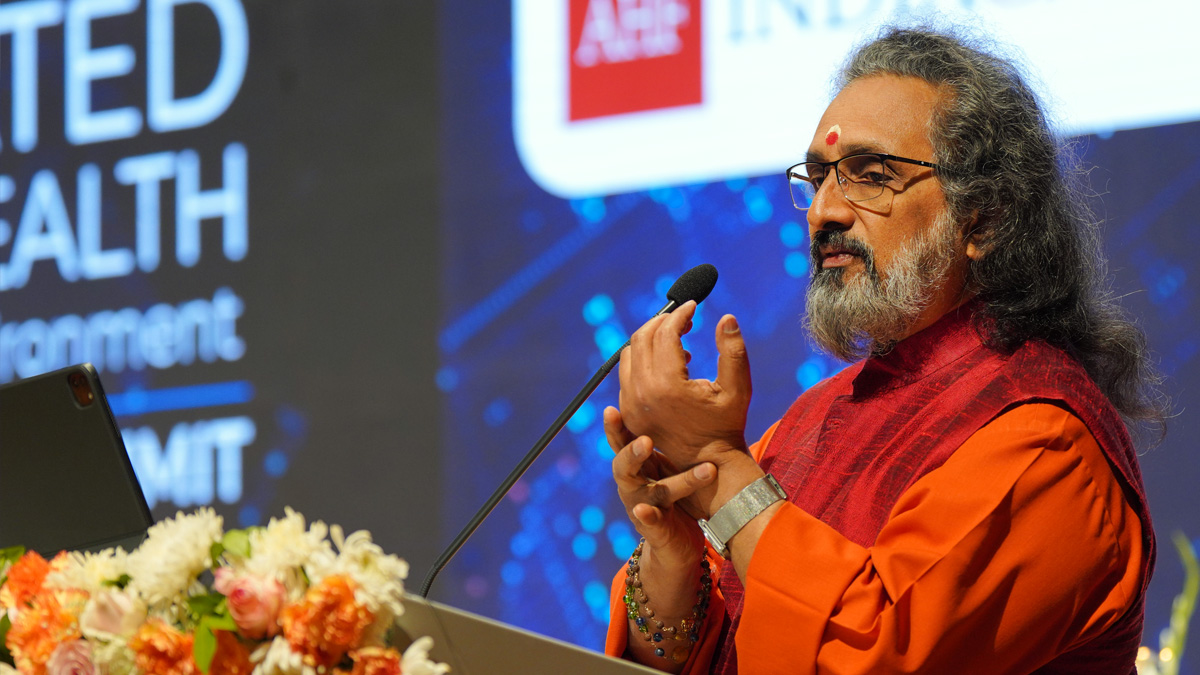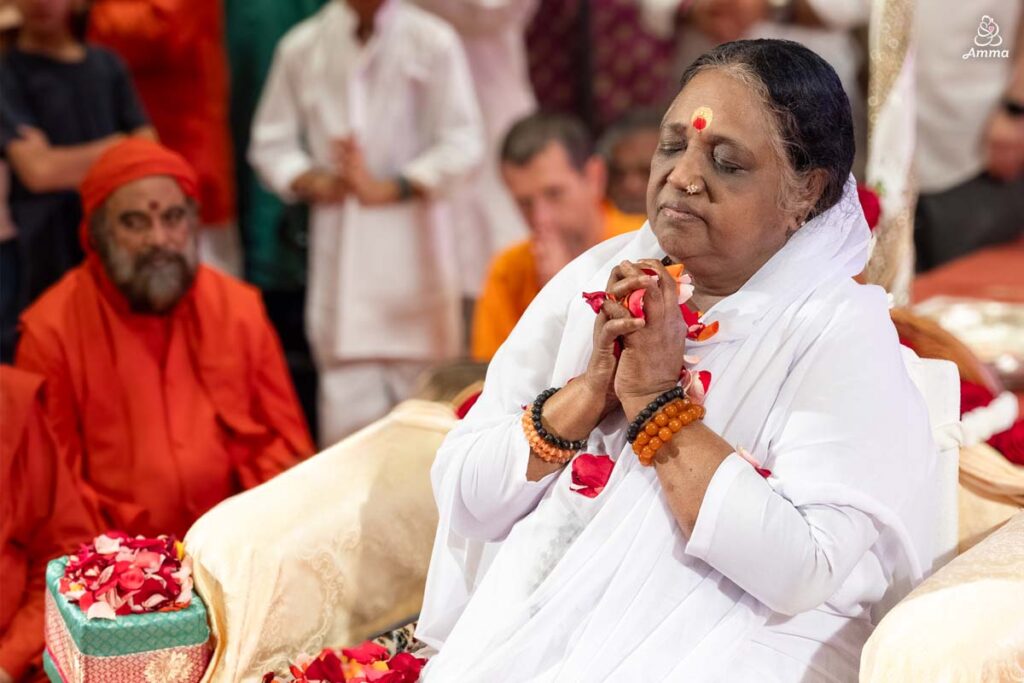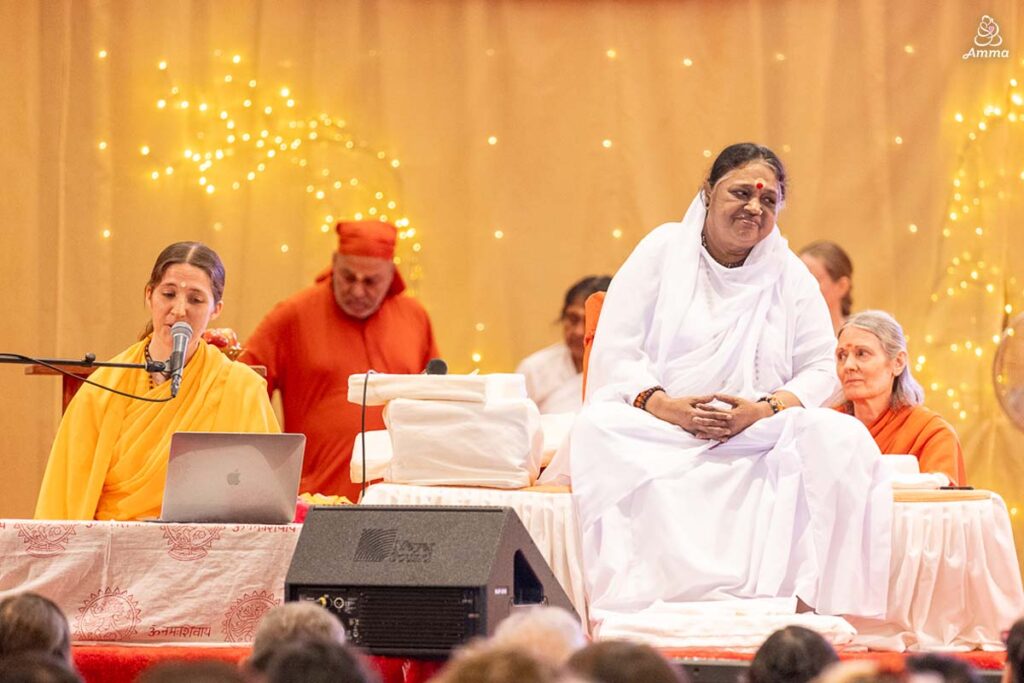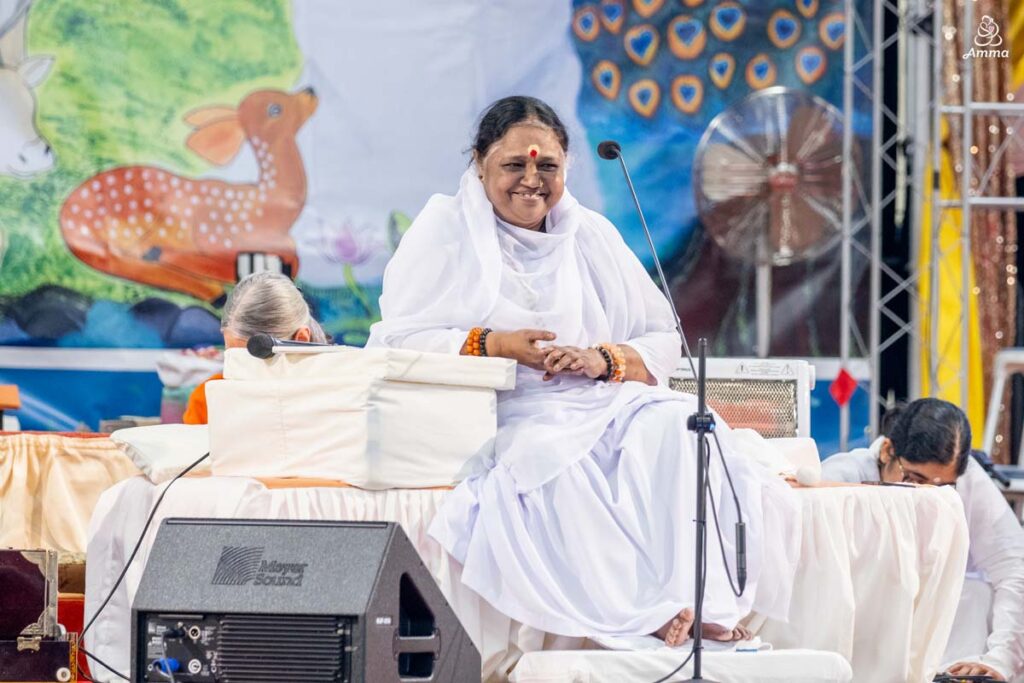The Integrated Holistic Health Summit of Civil 20 (C20), one of the official Engagement Groups of India’s G20 Presidency, took place at Amrita Hospital, Faridabad. Delegates from more than 700 civil society organisations (CSOs), health professionals, educators, and leaders from across the public health landscape participated in discussions and workshops that directly impact the policy recommendations for the C20 Summit set to take place in Jaipur in July.
In her video message, Amma, as the Chair of C20, said, “Integrated healthcare is a part of the C20 process. Today, most people perceive health only as related to the physical body. However, human existence is not merely at the level of the body. Mental, intellectual, and emotional health are also important. Over and above, we must acknowledge the strength of the all-pervasive spirit, the ātma-śakti, that imbues everything with consciousness. When one gives all these factors equal importance in one’s life, the meaning of healthcare becomes complete.”
Amma continued, “Modern medicine and treatment systems are certainly important and have their place. However, real healthcare is not just seeking medical treatment when sick. In reality, Nature is our closest friend because we ourselves are Nature. Therefore, moving in harmony with Nature is most important for holistic health. Without connecting to Nature and without Her blessings, holistic health is impossible.“
“If we want a lasting solution to the atrocities humankind is facing today and will have to face in the future, we should be willing to change our internal climate. What is happening in the external environment—be it global warming or climate change—is but a reflection of the harsh climate in our minds. Let us all proceed to work selflessly for the world’s welfare. May this world grow and prosper as one family, united in love.”
The Honourable Shri Manohar Lal, Chief Minister of Haryana, inaugurated the Summit. Other dignitaries included Tedros Adhanom Ghebreyesus, Director General of the World Health Organization (WHO); former Health Ministers from Argentina, Rwanda, and Malawi; Swami Amritaswarupananda Puri, Vice Chairman, Mata Amritanandamayi Math and Troika Member C20; and Vijay K. Nambiar, C20 Sherpa.
“Health is a basic necessity of life that leads contentment among people, contributing to the overall Happiness Index,” said Shri Manohar Lal in his inaugural address. “We need to develop and adopt traditional systems of health so that we do not fall ill at all. While Government budgets are high for treatment of disease, there is not enough attention on staying healthy by prevention of disease.”
“In Haryana, we have started focusing on both physical and mental health of people. We have made a program to open wellness centres, including Yoga and Ayurveda, in each village. Work on 700 such centres has already begun.”
Tedros Adhanom Ghebreyesus (WHO) addressed the gathering virtually. He emphasized how although the world is halfway to Sustainable Development Goals (SDGs), there are many challenges ahead to reach the SDG health targets. Even before the pandemic, billions of people around the world did not have essential health services, either because they could not access them or they could not afford them. Now COVID-19 has worsened the situation with 90 percent of countries reporting disruptions in essential health services.
“COVID-19 has shown why universal health coverage is so important and why we must pursue it with even more determination, innovation and collaboration,” Ghebreyesus said. “That is why one of the WHO’s top priorities is to reorient health systems towards primary healthcare and foundation of universal health coverage and health security. Integrating evidence-based traditional medicine into national health systems can contribute to achieving health for all.”
In his address, Swami Amritaswarupananda Puri added that to improve our healthcare systems as a society, we can each return to traditional spiritual practices to strengthen internal well-being, as this then supports our physical and mental health.
“Doctors should find time to do meditation to tap into their intuitive mind and spiritual energies, much like our ancient Ayurvedic physicians and seers. To spread goodness and health, they need to mix medication with meditation, as that would lead to a qualitative shift in both the doctor and the patient,” he said.
“If the Group of 20 countries became ambassadors of goodness—Goodness 20—that will tremendously benefit the developing and underdeveloped countries. It will help goodness to prevail in a hurting world, and all will be good.”




Dr. Priya Nair with Amrita Hospitals is the Coordinator of the Integrated Holistic Health (IHH) working group. She emphasized that despite the overbearing presence of COVID-19, the major causes of deaths and morbidity continue to be Ischemic Heart Disease, stroke, cancers, and chronic respiratory diseases.
With this background, IHH is focused on seven key areas of public health: mental health, nutrition, women’s and children’s health, elderly care, holistic health approaches, the reduction of non-communicable diseases, and the concept of One Health – a new approach that strives to achieve optimal health outcomes by recognising the interconnection between people, animals, plants, and our shared environment.
“Our work is aligned to the United Nations Sustainable Development Goals (SDGs), addressing 12 of the 13 SDG targets alongside the FCTC and MPOWER of the WHO. The working group aims to identify, articulate, discuss, and address key health challenges,” she said.
“Under the auspices of holistic health, we are also returning to traditional and alternative forms of medicine, including Yoga and meditation. This would help suggest policy frameworks to address the same for the betterment of society in general. We seek to both illuminate how best to reinforce global healthcare systems and their attendant gaps while also redefining ‘health for all’.”
Over the course of the Summit, the participants finalized a list of solutions, along with examples of best practices (Udaaharans) as proof of concept. The discussions proved vital to drafting a well-rounded policy pack for the C20 Summit, which will then impact policy recommendations for the Heads of State in attendance at India’s G20 Summit in September.
Prof. Agnes Binagwaho, former Health Minister of Rwanda, made a profound observation during the closing ceremonies of the Summit: “We are focused on access to better holistic integrated care, and we are going with hope because we know what we can do to do better.”





